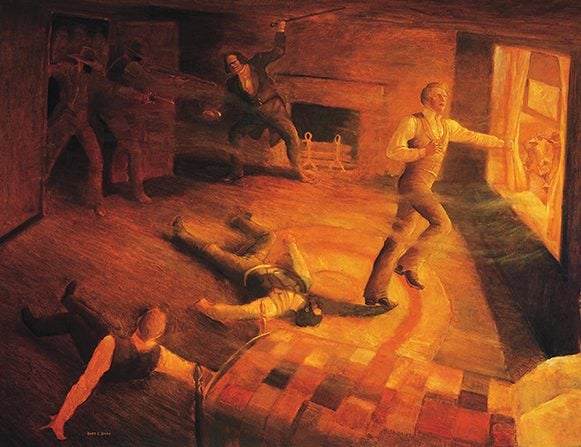
(LDS Media Library)
The quotations below are drawn from Hyrum L. Andrus and Helen Mae Andrus, Personal Glimpses of the Prophet Joseph Smith (American Fork, Utah: Covenant Communications, 2009):
Joseph F. Smith (1838-1918), sixth president of the Church of Jesus Christ of Latter-day Saints — whose father, the Patriarch Hyrum Smith, and uncle, the Prophet Joseph Smith, were both murdered by an anti-Mormon mob on 27 June 1844 — made this excellent observation:
The world says that Joseph Smith was an indolent person. The Church of Jesus Christ of Latter-day Saints was organized April 6th, 1830. Joseph Smith was martyred in Carthage, Illinois, on the 27th of June 1844 — 14 years after the organization of the Church. What did he accomplish in these 14 years? He opened up communication with the heavens in his youth. He brought forth the Book of Mormon, which contains the fullness of the Gospel; and the revelations contained in the Doctrine and Covenants; restored the Holy Priesthood unto man; established and organized the Church of Jesus Christ of Latter-day Saints, an organization that has no parallel in all the world, and which all the cunning and wisdom of men for ages has failed to discover or produce and never could have done.
He founded colonies in the States of New York, Ohio, Missouri, and Illinois, and pointed the way for the gathering of the Saints into the Rocky Mountains; sent the Gospel into Europe and to the islands of the sea; founded the town of Kirtland, Ohio, and there built a temple that cost about a quarter of a million dollars [well over $6.5 milliion in 2018 prices]; he founded the city of Nauvoo in the midst of persecution; gathered into Nauvoo and its vicinity some 20,000 people, and commenced the building of a temple there, which when completed cost one million dollars [in 2018 terms, just under $32 million]; and doing all this he had to contend against the prejudices of the age, against relentless persecution, mobocracy and vile calumny and slander, that was heaped upon him from all quarters without stint or measure. In a word, he did more [for the salvation of mankind] in from 14 to 20 years than any other man save Jesus only, that ever lived. (181)
Washington B. Rogers gave an interview to a reporter from The Tri-Weekly Journal of Logan, Utah, that was published on the hundredth anniversary of Joseph Smith’s birth, 23 December 1905:
Did I know the Prophet? Well, I should think I did. I was one of his hired men for several years, you know, and that simply means that I was a member of his family.
What sort of a man was he? He was the biggest-hearted, bravest, most whole-souled man I ever knew. That’s what he was, and if ever I loved a man, it was Joseph Smith. Outside of all his priestly connections he was an admirable man — a good man. I tell you, at least that’s the way I regarded him. . . .
The Prophet Joseph was always kind and sympathetic in his way, but he wasn’t afraid to rebuke anyone, and I never knew anybody that was any franker than he was. He called a spade a spade, you bet, and he was just as brave and fearless as he was outspoken.
After some additional comments and stories, Rogers sums things up as follows:
Well, I reckon that’s about all I can think of, that you’d want to know. Of course there’s lots more I know about Joseph Smith, if it would only come to my mind right now, but it won’t. But you can’t make my affections appear too strong for that noble man. He certainly was a man of men. I reckon I’d been workin’ for him yet, if he’d lived. I reckon I would. (162-164).
Posted from Newport Beach, California










